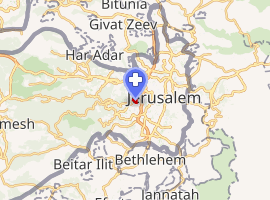Shaare Zedek Medical Center
The Shaare Zedek Medical Center (Hebrew: מרכז רפואי שערי צדק, Merkaz Refu'i Sha'arei Tzedek) (lit. "Gates of Justice") is a major hospital in Jerusalem established in 1902.
| Shaare Zedek Medical Center מרכז רפואי שערי צדק | |
|---|---|
 | |
Shaare Zedek Medical Center | |

| |
| Geography | |
| Location | Jerusalem |
| Organisation | |
| Type | General hospital |
| Affiliated university | Hebrew University of Jerusalem |
| Services | |
| Emergency department | yes |
| Beds | 1,000 |
| Helipad | yes |
| History | |
| Opened | 1902 |
| Links | |
| Website | szmc.org.il |
History
Shaare Zedek was the first large hospital to be located in the Western portion of Jerusalem and is today the city's fastest growing hospital and the only major medical facility in the city's center. After the Ottoman Turks gave permission in the 1890s, and with funding from European donors, the hospital was built on Jaffa Road, two miles (3 km) outside the Old City. Its opening ceremony took place on January 27, 1902. Dr. Moshe Wallach was the director from then until 1947. Schwester Selma lived in the hospital and cared for abandoned children. The building in Bayit Vegan was inaugurated in 1980.
In December 2012, Shaare Zedek assumed operational control over Bikur Cholim Hospital and merged many of its activities.[1] The hospital treats over 600,000 patients per year in more than 30 inpatient departments and over 70 outpatient units and maintains a very active academic service as a leading research and teaching institution. Shaare Zedek is classified as a public/private hospital, serving as a non-profit institution and dependent on donor support for capital development, while committed to offering advanced medical care for the wider Jerusalem-area community.
Facilities
Shaare Zedek Medical Center is located across two major campuses. The main campus is located on an 11.5-acre (47,000 m2) site between the neighborhoods of Bayit VeGan in the south and Ramat Beit HaKerem in the north, east of Mount Herzl in southwest Jerusalem. The downtown campus, formerly known as Bikur Cholim Hospital, is located in the heart of Jerusalem's downtown commercial zone.
The hospital has 1000 beds and treats over 500,000 patients a year in its in-patient and out-patient facilities.
As terrorist attacks in Jerusalem reached a peak in 2001–04, Shaare Zedek treated more victims than any other hospital in Israel. The hospital's trauma unit located within its Weinstock Department of Emergency Medicine on the Fanya Gottesfeld Heller Floor has become a model for emergency medicine and handling large-scale mass casualty incidents. The main hospital campus, completed in 1979, consists of ten interconnected buildings with the central structure being a ten-story building which houses the in-patient departments. The bottom three floors are located underground so as to allow the hospital to continue to operate even during wartime under the threat of missile strike. The Department of Emergency Medicine, the Wohl Surgical Operating Complex inaugurated in 2010, the Pharmacy and critical supply areas are all located in this underground portion and other areas of the hospital can be evacuated to this portion when necessary.
Shaare Zedek is well known for its extensive decontamination facilities capable of responding to terrorist attacks. The hospital acts as the on-call facility for the entire Jerusalem area to respond to chemical warfare attacks. Shaare Zedek's decontamination facilities served as an inspiration for New York's largest similar facility at the New York Downtown Hospital.[2]
Administration
Shaare Zedek is a private hospital that relies on fundraising for capital development projects. The director general of the hospital is Prof. Ofer Merin. Professor Jonathan Halevy who served as the Director General of the hospital from 1988 until 2019 was appointed as the Medical Center's President.
The hospital maintains public relations offices in ten countries, among them England and the United States.[3] An interesting fact is that a high percentage of the hospital's physicians and other staff are immigrants, especially from English-speaking countries.
Departments
Wohl Surgical Operating Complex
In June 2007, Shaare Zedek began several major construction efforts on its facilities, including the complete renovation of its surgical facilities, now known as the Wohl Surgical Operating Complex, which opened in the fall of 2010. The unit is spread over two floors in the hospital's underground section (in future). Nowadays this unit located in just one (second) floor.
The Next Generation Building
In early 2014, Shaare Zedek is scheduled to open the first phase of The Next Generation Building which will serve as a comprehensive response to medical care for children from infancy through adolescence., The ten-story building will house the Wilf Children's Hospital Part of the Wilf Children's Hospital is the Glaubach Department of Pediatric Emergency Medicine which is today Jerusalem's fastest growing urgent care center for children'. It also includes a pediatric intensive care unit (PICU), as well as departments for pediatric neurology, cardiology, urology, nephrology, rheumatology, pulmonology, hematology, gastroenterology, infectious disease, and neonatology. Other units in the hospital which offer consultation and treatment to pediatric patients include ophthalmology, ear nose and throat, psychiatry, orthopedics, and neuropsychology. The Next Generation Building will also see the expansion of the hospital's maternity facilities, currently among the most active in the Western world. Two new additional mother and infant departments will be opened alongside an all new Neonatal Intensive Care Unit, which will be the largest and most advanced of its type in Israel.
Wilf Women and Infant Center
A third maternity department was opened in March 2009. Well over 1200 children are born in the hospital each month, on average; this figure is higher than that of all other Jerusalem hospitals combined and in fact makes the hospital the most active maternity hospital in all of Israel. With the merger with Bikur Cholim Hospital in December 2012, the number of births under the Shaare Zedek name grew to over 20,000 a year, establishing the hospital as the most active maternity facility in the Western world. The center includes over 100 maternity beds with significant expansion planned within The Next Generation Building.
Jesselson Heart Center
The entire tenth floor of the hospital has been converted to form the Jesselson Heart Center, which combines cardiology and cardiothoracic surgery. In 2008, it was the first hospital in Israel to replace heart valves via cardiac catheterization.[4]
Weinstock Family Department of Emergency Medicine
Shaare Zedek's emergency department is the busiest in Jerusalem. It is capable of handling all emergencies, with the exception of neurosurgical ones. The department includes the Kennedy Leigh Trauma & Resuscitation Center. It includes a 14-bed observation and short stay unit, as well as a 5-bed chest pain unit. The new department, opened in the early 2000s, is more than three times larger than the previous one. It served about 112,000 patients in 2012.[5]
Orthopedics Department
The department includes separate units for the spine, arthroscopy, hand surgery, joint reconstruction, and foot and ankle care. A total of 14 orthopedic surgeons form the core of the unit, which receives patients from around the country.
Integrated oncology and palliative medicine department
Shaare Zedek was the first hospital in Israel to develop fully integrated oncology and palliative medicine services in 1994. The model of care developed at Shaare Zedek formed the basis for the 13 criteria for designation of a cancer center as a center of integrated oncology and palliative care that was developed by the European Society of Medical Oncology (ESMO).
Special units
The hospital has several specialized units for specific diseases, namely Gaucher's disease and cystic fibrosis. In September 2008, the hospital treated Georgians wounded in that country's war with Russia.
In addition, a new department of neurosurgery headed by Dr. Nevo Margalit, began working in 2017 and consists of skull base surgery, neurooncoloy, pediatric neurosurgery, orthopedic surgery and trauma services.
Notable persons
- Naomi Amir (1931–1995), American-Israeli pediatric neurologist, created and headed full-service diagnostic, evaluation, and intervention center at Shaare Zedek.
- David Applebaum (1952–2003), American-born Israeli physician and rabbi, chief of emergency room and trauma services of Shaare Zedek, murdered in a Palestinian suicide bombing.
- Rachel Chalkowski (born 1939), midwife and a gemach organizer, worked as a midwife at Shaare Zedek/
- David L. Reich, American academic anesthesiologist, President & Chief Operating Officer of the Mount Sinai Hospital, and President of Mount Sinai Queens, studied as a medical student at Shaare Zedek
- Avraham Steinberg (born 1947), medical ethicist, pediatric neurologist, rabbi and editor of Talmudic literature, Director of Medical Ethics Unit at Shaare Zedek
- Moshe Wallach (1866–1957), German Jewish physician, founder of Shaare Zedek, which he directed for 45 years.
- Jonathan Halevy (born 1947), Prominent public healthcare expert, served as Director General of Shaare Zedek for 31 years between 1988 and 2019.
Notable births at Shaare Zedek
- Yitzhak Rabin (1922–1995), fifth Prime Minister of Israel[6]
References
- 2012 statistics
- "Terror Attacks Spawn Sophisticated 'Decon' Unit". New York Sun. 3 January 2007. Retrieved 23 December 2018.
- "SZ World Offices". Archived from the original on December 31, 2006. Retrieved August 9, 2018.
- "Shaare Zedek Introduces Groundbreaking New Cardiac Procedure to Israel", August 2008 Archived September 28, 2008, at the Wayback Machine
- "Hospital is Number One Choice for Urgent Care in Jerusalem", December 2007 Archived September 28, 2008, at the Wayback Machine
- "50 Israeli Achievements". virtualjerusalem.com. Retrieved 4 November 2012.
External links
| Wikimedia Commons has media related to Shaare Zedek Medical Center, Bayit veGan. |